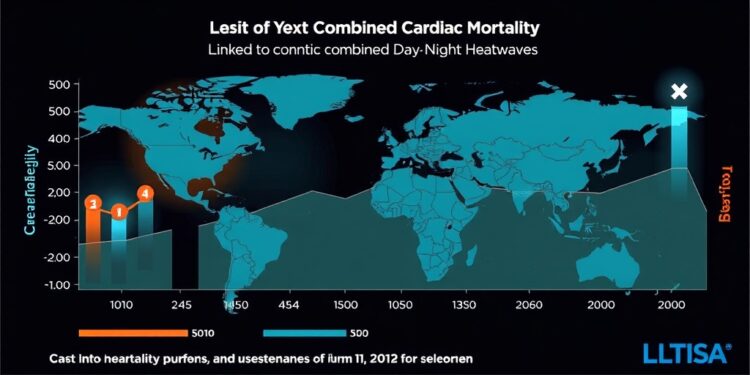The relationship between heatwaves and cardiovascular mortality has gained increasing attention as climate change continues to intensify. Recently published research in the flagship journal JACC, highlights the significant rise in cardiac-related deaths associated with compound heatwaves. These are defined as periods where daytime temperatures remain elevated and do not drop appreciably at night. This new study urges a reconsideration of how we assess the impacts of extreme heat on heart health, suggesting that historical definitions of heatwave events may have grossly underestimated their lethal risks.
The study, which analyzed an astonishing dataset of nearly 2.4 million cardiovascular deaths over a six-year period in mainland China, discovered critical insights into the specific vulnerabilities of various heart disease types to extreme heat. The researchers employed a novel metric termed Excess Cumulative Temperatures in Heatwaves, or ECT-HW. Unlike traditional binary indicators that merely classify heatwaves as present or absent, this metric encapsulates a variety of heatwave characteristics, such as intensity, timing, and duration. This granular approach to analyzing temperature exposure allows for a more nuanced understanding of the risk posed by different heatwave patterns.
Intriguingly, the findings suggest that compound heatwaves—those characterized by persistent high temperatures both day and night—are particularly harmful to cardiac health when compared to daytime-exclusive or nighttime-exclusive heatwaves. The risk of mortality remained steadily increased without reaching a clear threshold for compound heatwaves, suggesting that even moderate exposures can pose a serious hazard. In contrast, the effects of daytime or nighttime heatwaves only appeared as risks once specific threshold temperatures were surpassed, leveling off at moderate levels of exposure. This nonlinear response pattern highlights the intricate relationship between temperature exposure and cardiac physiology.
The authors identified varying sensitivities among different forms of heart disease. Acute myocardial infarction, sudden cardiac arrest, and heart failure were recognized as particularly susceptible to the heightened risks posed by compound heatwaves. Conversely, patients suffering from pulmonary heart disease experienced increased risks predominantly at high-intensity exposures. This disparity implies that any mitigation strategies would need a tailored approach, emphasizing the importance of distinguishing between heatwave types when assessing health risks.
Recent heat-related mortality studies that rely solely on traditional definitions of heatwaves may be inadvertently downplaying the true impact of such events on public health. By failing to consider the complex interplay of heatwave characteristics, past research may have underestimated the mortality risks associated, by as much as 54%. The implications of this oversight are profound, suggesting that guidelines for protecting vulnerable populations may be fundamentally flawed.
As climate change accelerates, the frequency and intensity of heatwaves are projected to rise. Scientists argue that the time for action is now, as urban centers become increasingly susceptible to severe heat events. The study acknowledges that targeted interventions, such as enhanced cooling centers and improved housing infrastructure, can provide critical relief for vulnerable populations, including the elderly and individuals with existing cardiovascular conditions.
Researchers are advocating for a paradigm shift in how public health officials develop heat health action plans. A comprehensive approach that incorporates the nuances of heatwave types into risk assessments would facilitate more robust early warning systems for cardiovascular patients, potentially saving thousands of lives. By delineating the potential impacts of compound heatwaves, this study aims to provoke discussions on how health systems should prepare for the increasingly alarming consequences of climate change and extreme weather events.
Furthermore, the findings will guide follow-up research aimed at projecting future cardiac mortality burdens amid changing climate conditions. This forward-looking perspective is essential as researchers explore new methodologies for incorporating heatwave impacts into prevention strategies, adapting health policies to mitigate the looming threats posed by climate change.
As the scientific community grapples with these critical revelations, medical professionals and public health experts must unite to ensure that strategies are in place to protect the most vulnerable. Without proactive measures to address heat-induced health crises, the increasing frequency of compound heatwaves could translate into rising mortality rates among those with pre-existing heart conditions.
Moreover, as researchers continue to expose the profound effects of climate change on cardiovascular health, it becomes vital for policymakers to take immediate action. Investing in robust public health infrastructures equipped to handle extreme weather will be essential for safeguarding population health in our warming world.
The study ultimately serves as a clarion call for enhanced surveillance of climate-related health risks, fostering collaborations that seek to establish effective preventive measures. Without question, understanding the intricate dynamics of temperature exposure will become increasingly important as we navigate the complexities of health in a changing climate.
Through rigorous data analysis and attention to individual heatwave characteristics, the public health narrative around climate change can evolve to incorporate these findings, further emphasizing the need for tailored strategies that accommodate diverse health profiles. As researchers, healthcare providers, and policymakers convene to respond to these revelations, future cardiovascular health frameworks will hopefully emerge, ensuring they are grounded in contemporary understandings of global warming’s repercussions on human health.
This groundbreaking study illustrates the necessity for a comprehensive understanding of environmental determinants of health, particularly in relation to cardiology. By acknowledging the escalating risks associated with compound heatwaves, the academic community can move toward actionable solutions to safeguard public health amidst a rapidly changing climate.
Subject of Research: The impact of compound heatwaves on cardiac mortality.
Article Title: Nonlinear Relation Between Cardiac Mortality and Excess Temperature in Heatwaves: Exposure Response in 2.39 Million Patients
News Publication Date: 24-Mar-2025
Web References: American College of Cardiology
References: JACC
Image Credits: N/A
Keywords: Heatwaves, Heart disease, Temperature, Cardiology, Urban populations, Cardiovascular disease, Mortality rates, Extreme weather events.




